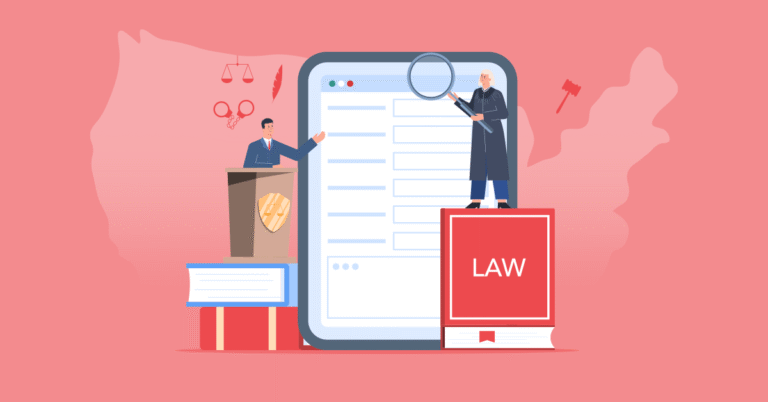
Navigating Multi-State Practice: A Guide to Practicing Law in Any State
09/13/2023 By Allison Lemasters
Our technologically advanced world has changed how we do business. We were once separated from others by geographic boundaries. Those rigid boundary lines have become fluid, opening the door to opportunities lost in geographic seclusion. One new phenomenon technology afforded us, known as “working remotely,” provides an alternative to office work. You can be anywhere and perform work if you have access to Wi-Fi, but can lawyers practice in any state?
The impact of technology and remote work in the legal field has created a new horizon ripe with innovation. As a result, today’s legal landscape has made law practice across multiple states easier. This open door to new opportunities can broaden the professional horizons of any ambitious practicing attorney.
Multi-state practice, also known as “reciprocity” or “admission pro hac vice,” complexities and regulations, lawyers desire to take on its challenge. Before you begin a multi-state practice, you must understand the steps and considerations for multi-state practice.
These considerations include licensing requirements, ethical obligations, Continuing Learning Education (CLE), legal software, case management tools, client relations, and local Rules and Court Procedures.
Can Lawyers Practice in Any State?
No, not without proper legal licensure. However, reciprocity is an alternative often regarded as the most effective means of relocating to another state. Reciprocity offers a seamless transition into a new jurisdiction. Reciprocity creates its primary advantage by giving you the option to attain full-fledged membership in the bar of most states you move into.
While being positioned as a multi-state legal practitioner is easier due to the expansive technological boom, the most significant barrier for aspiring lawyers is the varying State-legislated bar exams. Each State crafts the Bar Exam to meet their jurisdictional needs.
Why Would a Lawyer Practice in Multiple States?
Access to a broader client base is one of the most significant reasons lawyers desire to practice in multiple jurisdictions. In addition, practicing across a general geographic location provides the opportunity to handle more diverse legal issues.
Another equally important consideration would be whether you live in a city that straddles state borders. Attorneys in cities such as Kansas City or states such as New Jersey, Connecticut, Rhode Island, and Vermont would benefit from being licensed in multiple states. To adequately provide equal justice, you must be licensed to practice within all of the city, not part of it.
Do Multi-State Lawyers Need a License for Every State?
Yes. Lawmakers have agreed there needs to be uniformity in legal licensing compliance across the States. One attempt to address this hurdle was the creation of the Uniform Bar Exam (UBE).
The UBE is a standardized variant of the Bar Exam, streamlining the process of transitioning your legal practice across state boundaries. Each state possesses the autonomy to define a passing score and how long your UBE score remains transferrable. So, check the state you are considering licensing in to ensure you meet their regulations.
Here are some tips to consider:
- You must clarify with each state’s Bar Association whether you are required to pass their unique Bar Exam, UBE, or can practice under reciprocity.
- To gain temporary practice permission in a jurisdiction representation via “pro hac vice” is the best option. Pro hac vice is utilized in specific cases and is subject to Court approval.
- It is essential to stay current with the latest licensing regulations and carefully research the requirements of each state you aim to practice in. These requirements vary significantly and will continue to evolve as law practice evolves.
Benefits of Practicing in Multiple States
Practicing law in multiple states offers several notable benefits for legal professionals. Here are some key advantages:
- Expanding into multiple states broadens your potential client base. You can tap into diverse markets and industries, potentially increasing your client roster and revenue streams.
- Different states have distinct laws and regulations. Practicing in multiple jurisdictions compels you to stay current on various legal codes, which can sharpen your legal knowledge and expertise.
- The challenges of multi-state practice can promote personal and professional growth. Adapting to diverse legal landscapes fosters problem-solving skills, adaptability, and resilience.
- Practicing in multiple states exposes you to various legal issues and cases. This diversity of experience can make you a more versatile and well-rounded attorney.
Ethics of Practicing Law Multi-State
The ethical aspects of multi-state practice revolve around maintaining the highest standards of professionalism, complying with each state’s rules of professional conduct, and upholding the attorney’s duty to their clients.
Ethical standards for law practice are influenced by the Model Rules enacted by the American Bar Association (ABA), accordingly. The ABA addressed the ethical standards for practicing across state lines in their Formal Opinion 504. It expressly states, “when a lawyer practices the law of more than one jurisdiction, choice-of-law questions arise concerning which jurisdiction’s ethics rules the lawyer must follow. Model Rule 8.5 provides that…the lawyer must comply with the ethics rules of the jurisdiction in which the tribunal sits, unless otherwise provided.”
6 Steps to Practice in Multiple States
Before jumping in, make a plan. By mastering law in different jurisdictions, you can seize opportunities, broaden your client base, and enhance your legal career. Our step-by-step guide equips you with the knowledge and strategies to succeed in multi-state practice.
- To practice in multiple states, start by researching and selecting your target states.
- When aiming to practice in multiple states, assess reciprocity agreements and admission criteria.
- Gather the required documents and information as part of the process.
- While this can be exciting, don’t get lost in the paperwork. Ensure you select, prepare, and submit the correct admission applications as you set yourself up to practice across multiple states,.
- Be careful to meet any extra requirements for licensure, exams, or interviews.
- As you continue your practice in multiple states, complete any required CLEs, maintain licenses, and stay compliant by keeping diligent records.
How Technology Supports Multi-State Lawyers
Technology plays a pivotal role in streamlining and enhancing multi-state practice. Technology enables lawyers to work remotely, which is especially valuable. Video conferencing, secure communication platforms, and cloud-based collaboration tools facilitate seamless communication with clients, colleagues, and courts across various states.
Bill4Time offers software and resources that streamline legal research, document management, and communication, which can help maintain a successful multi-state firm.
Specialized case management software allows you to manage your workload across multiple states. These tools enable document management, time tracking, billing and invoicing, and client communication in a centralized and organized manner.
Expand Your Practice
Whether you’re interested in taking on cases in neighboring states or establishing a nationwide practice, embrace the possibilities that come with a well-rounded understanding of multi-state practice and elevate your legal career to new heights.
There are many benefits to practicing across multiple states; however, there is the potential of learning numerous state-specific laws, having to pass the bar again, and hard work.
Above all else, maintaining ethical integrity and adhering to renewal regulations is critical to continue practicing across state boundaries. Many software platforms do the work, so you are free to do what you love.
Now that you have a strong understanding of what it takes to run a multi-state practice, consider Bill4Time as an effective solution for managing your virtual firm needs. Its document, practice, and case management software will assist in breaking down geographical barriers, enhance communication, streamline administrative tasks, and provide abundant legal resources, giving you a competitive edge in your practice.
Schedule a demo with Bill4Time today to show you how we can help you go the distance!



